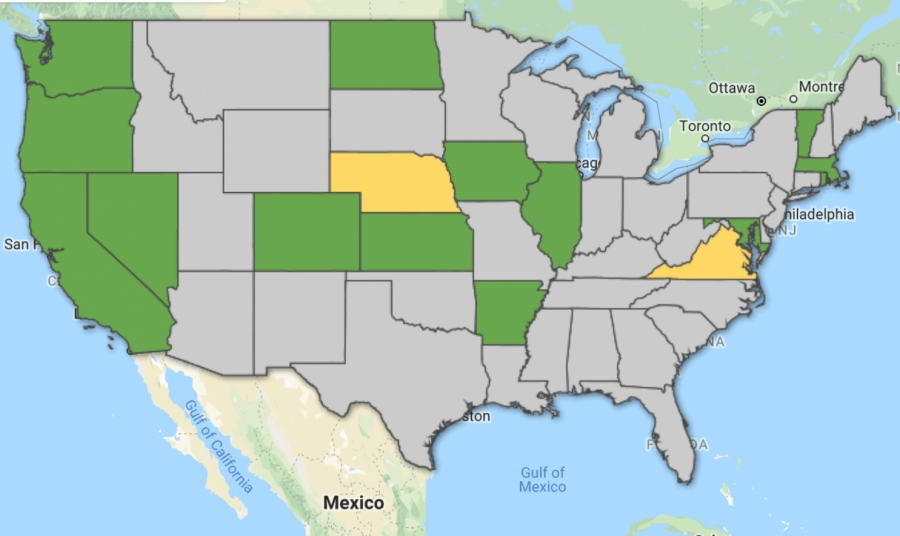In Support of New Voices
Proposed “New Voices” bill would provide valuable protections for student journalists in Virginia
Photo courtesy of Student Press Law Center
Currently, the 14 states highlighted in green have passed a “New Voices” law providing explicit free speech protection for school publications. Campaigns to pass this law are underway in Virginia and Nebraska, denoted by their yellow shading.
January 23, 2019
“The paper here at school is mine to control.”
These nine words marked Principal Andy Campbell’s statement to The Kansas City Star after student journalists at Harrisonville High School in Harrisonville, Mo. published an article on the district superintendent’s resignation without Campbell’s approval of their story.
This tension between student journalists and school administrators over who has the authority to determine what can be published is not unique to Harrisonville. Principal Clarence Burton III pulled a story about the spread of a new drug at Fauquier High School in Warrenton, Va., citing concerns about the appropriateness of the topic. Even at our school, where we receive steadfast support from administrators and have the freedom to set our own agenda of content, journalists and sources alike worry about institutional blowback when discussing weighty topics.
A new bill in the Va. General Assembly could potentially prevent student journalists from punishment from their school’s administration. In response to the multitude of cases regarding student newspaper censorship, former journalists Delegate Chris Hurst and Delegate Danica Roem have introduced a bill that would give student journalists free speech protection. House Bill 2382, often referred to as the “New Voices” bill, would make it illegal for school administrators to censor student writing unless it is libelous, slanderous, invasive to an individual’s privacy, or otherwise illegal.
According to the Student Press Law Center, 14 states across the country have already passed a version of the “New Voices” bill into law. Remaining states, including Virginia, currently follow the precedent set by the 1988 Hazelwood v Kuhlmeier case, in which the Supreme Court ruled that a school can censor“articles that it deemed inappropriate and that might appear to have the imprimatur [support] of the school”. This decision has set too vague a standard to guarantee free press protections, leaving the door open for the censorship of content that sheds light on scandals or critiques school administration.
At our school, we are fortunate to not require a prior review from administration before publishing our online and print articles. This has encouraged us to cover complex and controversial subjects, such as sexual harassment, mental health, ethical concerns about competitive research, and political issues that affect our student body. The “New Voices” bill would ensure that student writers all across Virginia have the same confidence to tell stories like these without fear of censorship or other legal consequences. Without such a mandate, student writers develop their craft either with the perpetual fear of censorship hanging over their heads, or with the safety blanket of knowing their work will be reviewed and verified for integrity by others. Neither prepares them for the world of professional journalism that lies beyond.
Even though we attend a school where the administration respects and supports our freedom of speech, many writers for tjTODAY still hesitate to cover controversial topics due to fear of backlash. In one instance, a staffer wanted to speak out about what she felt was an unfair dress code policy with a personal anecdote but worried about the repercussions she could face for writing an opinion piece on the issue. As formal legal protection for this type of free expression, the “New Voices” bill would go a long way toward assuaging such fears.
Publications also have strict and timely deadlines, ones that would be extremely difficult to meet if a school administrator had to review every article before being published. tjTODAY strives to post on our website daily and publishes a 28-page magazine nearly every month. If any content had to be changed or removed due to the administration’s disapproval, it is likely that our deadlines would not be met. Prior review guidelines also eat away at the time administrators have to fulfill their other responsibilities for keeping the school running.
This is where publication advisors—adults trained in journalistic practices—can play a critical role, one that opponents of the bill may not have considered. While advisers can’t necessarily prohibit the publication of an article given that student journalism is inherently student-run, they are able to give students insights on how to approach difficult topics and remain unbiased in reporting. Advisers provide a crucial balance between adult supervision and infringing on students’ rights, and the “New Voices” bill would also be protecting any adviser who supports their publication’s right to free speech.
Our own adviser, Erinn Harris, continually offers guidance and checks our articles for both print and online publications to ensure that the facts, testimonies, and sources allow for unbiased writing. Even more so, she advises the staff members to maintain the integrity of a student-run initiative while adhering to tjTODAY’s mission statement. In essence, the works of individual staff members represent the entity of tjTODAY without the limitations of censorship and permission.
After looking at the language of the bill, the staff of tjTODAY strongly supports the passing of the new legislation. It would strike a balance between protecting student journalists telling important stories and ensuring misleading, defamatory, or incendiary content is still blocked from publication. Every student publication deserves the freedom to write about issues prevalent in their school community without fear of being punished. Journalism is a tool for positive change, and the freedom to initiate that change by writing pieces on in-depth subjects should not be reserved only for professional publications. Student journalists deserve the same opportunity to wield the power of the press in order to raise awareness, push for progress, and make a difference. The New Voices bill is integral to providing students with this right and improving journalistic practices in public schools across the state.






